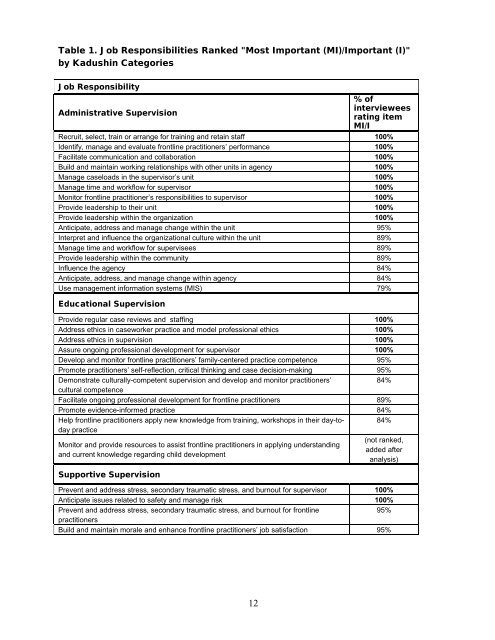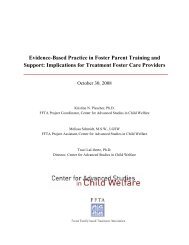Table 1. Job Responsibilities Ranked "Most Important (MI)/Important (I)"by Kadushin CategoriesJob Responsibility% ofAdministrative <strong>Supervision</strong>intervieweesrating itemMI/IRecruit, select, train or arrange <strong>for</strong> training <strong>and</strong> retain staff 100%Identify, manage <strong>and</strong> evaluate frontline practitioners’ per<strong>for</strong>mance 100%Facilitate communication <strong>and</strong> collaboration 100%Build <strong>and</strong> maintain working relationships with other units in agency 100%Manage caseloads in the supervisor’s unit 100%Manage time <strong>and</strong> workflow <strong>for</strong> supervisor 100%Monitor frontline practitioner’s responsibilities to supervisor 100%Provide leadership to their unit 100%Provide leadership within the organization 100%Anticipate, address <strong>and</strong> manage change within the unit 95%Interpret <strong>and</strong> influence the organizational culture within the unit 89%Manage time <strong>and</strong> workflow <strong>for</strong> supervisees 89%Provide leadership within the community 89%Influence the agency 84%Anticipate, address, <strong>and</strong> manage change within agency 84%Use management in<strong>for</strong>mation systems (MIS) 79%Educational <strong>Supervision</strong>Provide regular case reviews <strong>and</strong> staffing 100%Address ethics in caseworker practice <strong>and</strong> model professional ethics 100%Address ethics in supervision 100%Assure ongoing professional development <strong>for</strong> supervisor 100%Develop <strong>and</strong> monitor frontline practitioners’ family-centered practice competence 95%Promote practitioners’ self-reflection, critical thinking <strong>and</strong> case decision-making 95%Demonstrate culturally-competent supervision <strong>and</strong> develop <strong>and</strong> monitor practitioners’84%cultural competenceFacilitate ongoing professional development <strong>for</strong> frontline practitioners 89%Promote evidence-in<strong>for</strong>med practice 84%Help frontline practitioners apply new knowledge from training, workshops in their day-today84%practiceMonitor <strong>and</strong> provide resources to assist frontline practitioners in applying underst<strong>and</strong>ing<strong>and</strong> current knowledge regarding child developmentSupportive <strong>Supervision</strong>(not ranked,added afteranalysis)Prevent <strong>and</strong> address stress, secondary traumatic stress, <strong>and</strong> burnout <strong>for</strong> supervisor 100%Anticipate issues related to safety <strong>and</strong> manage risk 100%Prevent <strong>and</strong> address stress, secondary traumatic stress, <strong>and</strong> burnout <strong>for</strong> frontline95%practitionersBuild <strong>and</strong> maintain morale <strong>and</strong> enhance frontline practitioners’ job satisfaction 95%12
We have categorized each job responsibility as administrative, educational, or supportive. Thecategory selected was based on the primary function the responsibility typically fulfills. However,the overlapping <strong>and</strong> complementary nature of these functions as described by Kadushin <strong>and</strong>Harkness (2002) cannot be over-emphasized. For example, when supervisors interpretorganizational culture to their supervisees, they provide both education <strong>and</strong> support. It should beemphasized that a child welfare supervisory model should recognize the need <strong>for</strong> balance amongthese three functions.The job responsibilities are described briefly below.Administrative <strong>Supervision</strong> ResponsibilitiesRecruit, select, train or arrange <strong>for</strong> training, <strong>and</strong> retain staff. The recruitment, selection, <strong>and</strong>training of frontline practitioners are ongoing activities critical to the quality of child welfare services.Our interviews indicate that persons other than an agency supervisor, such as human resourcespersonnel <strong>and</strong> agency training staff, often carry out aspects of these activities. However, the retentionof frontline practitioners has consistently been found to be associated with the quality of supervision<strong>and</strong> having a supportive <strong>and</strong> consultative supervisor (Dickinson & Perry 2002; Jacquet, et al. 2007;Renner, Porter, & Preister 2008). Clearly, staff retention is related to a supervisor’s effectiveper<strong>for</strong>mance of all three supervisory functions.Identify, manage, <strong>and</strong> evaluate frontline practitioners’per<strong>for</strong>mance. On an ongoing basis, an effective supervisor mustbe able to openly discuss <strong>and</strong> describe what a child welfarepractitioner is doing that contributes to desired outcomes orcreates problems; identify why a particular behavior should becontinued or is problematic; specify what the employee shoulddo similarly or differently; <strong>and</strong> outline consequences <strong>for</strong>succeeding or failing to maintain or change behaviors (Hughes,et al. 1991; Salus 2004). Supervisors must reward excellentper<strong>for</strong>mance as well as identify, document, <strong>and</strong> addressper<strong>for</strong>mance problems <strong>and</strong> staff impairment as required inagency personnel practices (Center <strong>for</strong> Advanced Studies in<strong>Child</strong> <strong>Welfare</strong> 2009:10; Hopkins & Austin 2004).The responsibility of thesupervisor in per<strong>for</strong>mancereviews is always to be awareof the quality of work underthe ethical imperative: “Do noharm.” — Center <strong>for</strong>Advanced Studies in <strong>Child</strong><strong>Welfare</strong> 2009:11Facilitate communication <strong>and</strong> collaboration.Supervisors share responsibility with otheragency supervisors, managers, <strong>and</strong> administrators<strong>for</strong> communication within their units, acrossunits, with community agencies <strong>and</strong> referralnetworks, <strong>and</strong> with the public. They also facilitatein<strong>for</strong>mation sharing <strong>and</strong> collaboration with fosterparents, agency attorneys, guardians ad litem,contractual service providers, <strong>and</strong> others involvedin service provision.Communication between units is veryimportant. We all need to get along. In ouragency, some of the people in different unitsused to not speak. Our supervisor has had a lotto do with changing that. - CaseworkerBuild <strong>and</strong> maintain working relationships with other units in agency. To facilitate timely <strong>and</strong>effective services, collaborative relationships among the agency’s units must be intentionallydeveloped <strong>and</strong> maintained. Supervisors carry the primary responsibility <strong>for</strong> these collaborativerelationships.13
- Page 3 and 4: AcknowledgementsThis report, Buildi
- Page 5 and 6: Executive SummaryA Call to Action f
- Page 7 and 8: IntroductionWhy is a Model of Child
- Page 9 and 10: • a continuum of professional dev
- Page 11: • providing knowledge and securit
- Page 14 and 15: necessary, and providing permanency
- Page 18: Manage caseloads in the supervisor
- Page 22 and 23: Supportive Supervision Responsibili
- Page 24 and 25: Element 4Mandate explicit, manageab
- Page 26 and 27: Element 7Support supervisors in the
- Page 28 and 29: Several activities are included to
- Page 30 and 31: Table 2. Job Responsibility Data Co
- Page 32 and 33: include "acknowledging effective pe
- Page 34 and 35: Component 2A model of supervisory p
- Page 36 and 37: • assigning ongoing cases to an e
- Page 38 and 39: • Develop an internal process to
- Page 40 and 41: A Continuum of Initial and Ongoing
- Page 42 and 43: Helpful Child Welfare and Training
- Page 44 and 45: Sources CitedAllnoch, A. (1998, Feb
- Page 46 and 47: welfare practice serving Indian com
- Page 48 and 49: Whittaker, J. & Maluccio, A. (2002)
- Page 50 and 51: The project team contacted potentia
- Page 52 and 53: Appendix BLiterature ReviewThe foll
- Page 54 and 55: Providing leadership within organiz
- Page 56 and 57: Ensure manageable staff/supervisor
- Page 58 and 59: prepared to move into permanent pos
- Page 60 and 61: • Place ASPIRE (TANF welfare to w
- Page 62 and 63: Facilitating Communication and Coll
- Page 64 and 65: • Document worker performance rel
- Page 66 and 67:
• Hiring diverse staff• Trainin
- Page 68 and 69:
Bernotavicz, F. (1997). Retention o
- Page 70 and 71:
O’Connor, M. (1997). Building Sup
- Page 72 and 73:
5h. If there is a discrepancy betwe
- Page 74 and 75:
Job Responsibilityissues, confident
- Page 76 and 77:
13a. Does your supervisor effective
- Page 78 and 79:
SUPERVISOR JOB RESPONSIBILITIES6. I
- Page 80 and 81:
Job ResponsibilityMost importantto
- Page 82 and 83:
11. Are there written resources (tr
- Page 84 and 85:
esponsibilities as “most importan
- Page 86 and 87:
Job responsibilityMost importantto
- Page 88 and 89:
Appendix DSample Job DescriptionJOB
- Page 90:
Data Conception: Requires the abili
















